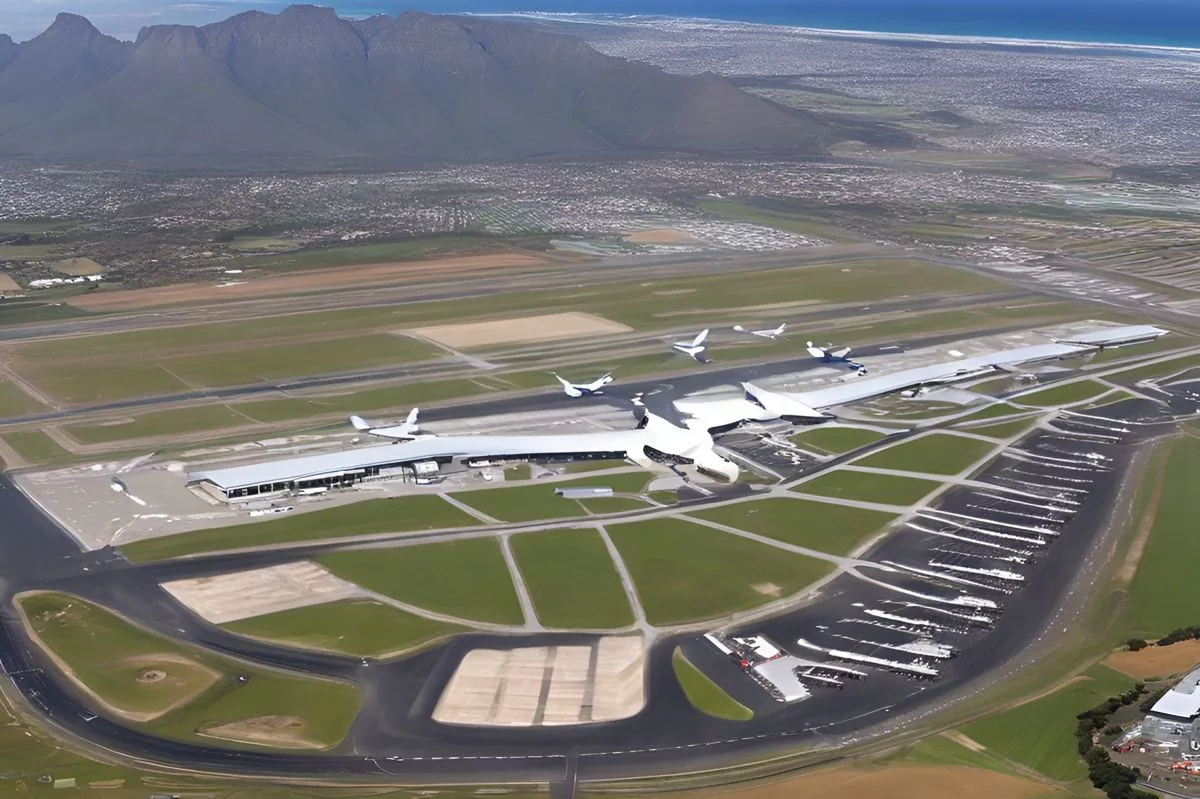The Cape Town Winelands Airport is undergoing an extensive expansion plan that aims to create a new era of economic growth and sustainability. The project includes the development of a Code F runway and additional facilities such as a plaza, hotel, conference center, and wine-tasting facilities. The expansion prioritizes environmental considerations, aiming to be completely off-grid for water and electricity by employing solar and biogas power derived from chicken manure. The project is expected to create 60,000 jobs during construction and capture one-fourth of the local market share by 2050 while balancing growth and sustainability.
What is the Cape Town Winelands Airport expansion plan?
The Cape Town Winelands Airport, originally constructed in 1943, is set to undergo an extensive expansion plan that includes the development of a Code F runway and additional facilities such as a plaza, hotel, conference center, and wine-tasting facilities. The expansion also prioritizes environmental considerations, aiming to be completely off-grid for water and electricity by employing solar and biogas power derived from chicken manure. The project is expected to create 60,000 jobs during construction and capture one-fourth of the local market share by 2050.
An Oasis in the Aviation Landscape
South Africa is poised for a major leap in rejuvenating its aviation and tourism industries as the global economy rebounds from the pandemic. A bold vision to elevate the Cape Town Winelands Airport near Durbanville into an integral global aviation hub is spearheaded by Nick Ferguson, managing director of rsa.AERO. This grand plan unfolds in sync with a 15-year contract with the Lufthansa Group.
The Winelands Airport, constructed in 1943 as the Fisantekraal Airport during World War II, has primarily catered to flight training, aircraft maintenance, charter operations, and leisure flying. The airport, which has largely remained a general flying field until now, is about to undergo an enormous transformation. An investment of around R7-billion is anticipated for the expansion, including the development of a Code F runway capable of accommodating large aircraft such as the Airbus A380, surpassing the capabilities of Cape Town International.
A Holistic Approach to Development
The expansion of the Winelands Airport goes beyond just a runway extension. The airport’s development strategy comprises a holistic vision that includes adding a plaza, a hotel, a conference centre, and even facilities for wine tasting. The innovative plan also prioritizes environmental considerations, with the airport aiming to be entirely off-grid for water and electricity by employing solar and biogas power derived from chicken manure.
The far-reaching vision for the airport also involves addressing the existing constraints in South Africa’s aviation industry. Currently, the country’s main aviation hubs are Cape Town International and O.R. Tambo in Johannesburg. These airports’ geographical locations result in considerable inter-airport travel distances and consequently high fuel costs for airlines.
Ferguson’s insightful comparison between the distance between Cape Town and Johannesburg to that between London and Berlin only emphasizes the urgency for strategically located alternative airports. This is where the strategic location of the Winelands Airport becomes a significant advantage. Once the airport becomes operational, estimated by 2027, the industry could potentially save about R1.2 billion, with a reduction of 110 million kilograms of fuel and approximately 60 million kilograms of carbon emissions.
A Supplementary Service with Socio-Economic Impact
The Cape Town Winelands Airport’s main objective is not to compete with Cape Town International, but rather to offer an alternative service, particularly for airlines who find it challenging to secure prime slots at the existing airport. Ferguson envisages the airport capturing one-fourth of the local market share by 2050, with one in every two passengers utilizing its facilities.
The airport development comes with significant socio-economic outcomes. The construction phase itself is expected to produce 60,000 jobs, thus contributing substantially to the local economy. James Vos, a member of the Cape Town mayoral committee for economic growth, has expressed his endorsement, emphasizing that the new airport would augment the city’s connectivity, attracting both domestic and international travellers, thereby opening up considerable opportunities for local businesses.
Balancing Growth and Sustainability
Despite the ambitious vision and the potential economic benefits, the project faces some obstacles. An official environmental impact assessment application is still pending, and public involvement remains crucial. Residents have voiced concerns about potential noise pollution and increased air traffic, underscoring the need for a balanced approach to development.
The Cape Town Winelands Airport project embodies entrepreneurial dynamism and progressive city planning. As it strives to meet its ambitious goals while navigating various challenges, this project has the potential to reshape South Africa’s aviation industry, stimulate the local economy, and set a benchmark for sustainable development in the aviation sector. Ultimately, the project’s success will hinge on its ability to strike a balance between growth and sustainability while addressing the concerns of the local community.
What facilities are included in the Cape Town Winelands Airport expansion plan?
The Cape Town Winelands Airport expansion plan includes the development of a Code F runway and additional facilities such as a plaza, hotel, conference center, and wine-tasting facilities.
What environmental considerations are being prioritized in the expansion plan?
The expansion plan prioritizes environmental considerations, aiming to be completely off-grid for water and electricity by employing solar and biogas power derived from chicken manure.
How many jobs are expected to be created during the construction phase of the project?
The project is expected to create 60,000 jobs during construction.
What is the expected market share capture of the Cape Town Winelands Airport by 2050?
The airport is expected to capture one-fourth of the local market share by 2050.
What socio-economic impacts will the airport development have?
The construction phase itself is expected to produce 60,000 jobs, thus contributing substantially to the local economy. The airport development is also expected to augment the city’s connectivity, attracting both domestic and international travellers, thereby opening up considerable opportunities for local businesses.
What obstacles does the Cape Town Winelands Airport project face?
The project faces some obstacles, including pending official environmental impact assessment application, public involvement concerns about potential noise pollution and increased air traffic. A balanced approach to development is crucial to address these concerns while striving to meet the ambitious goals of the project.












